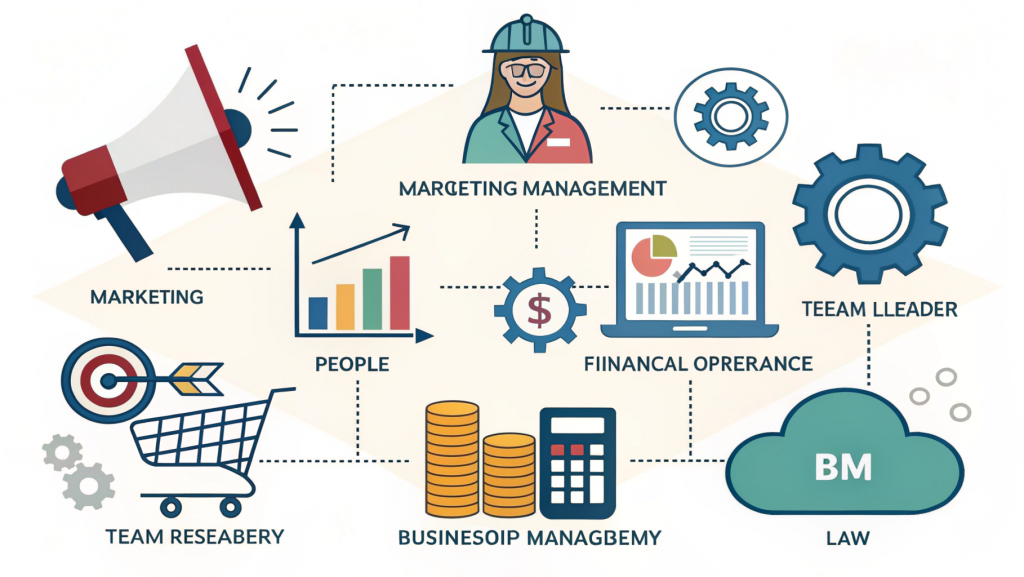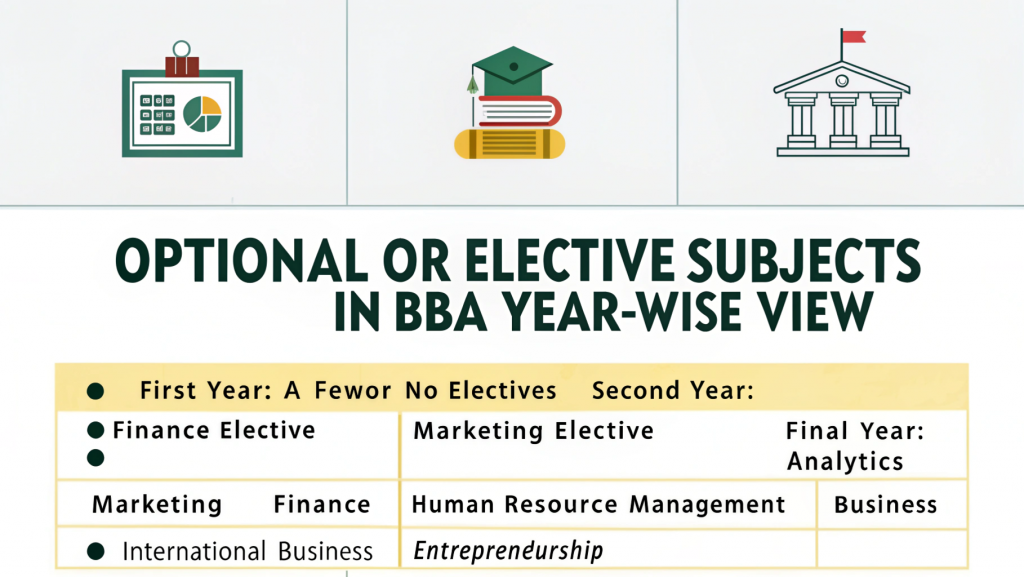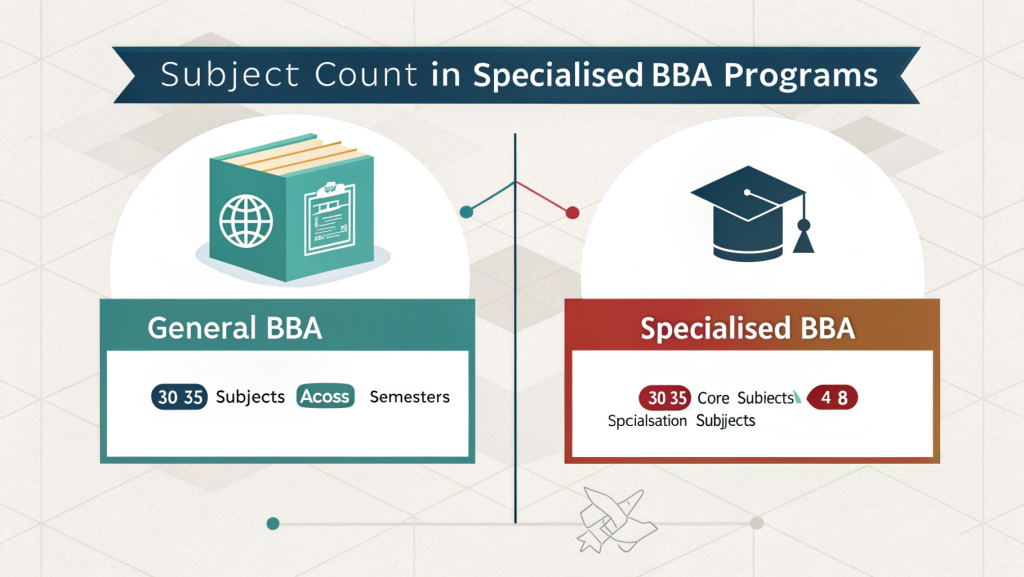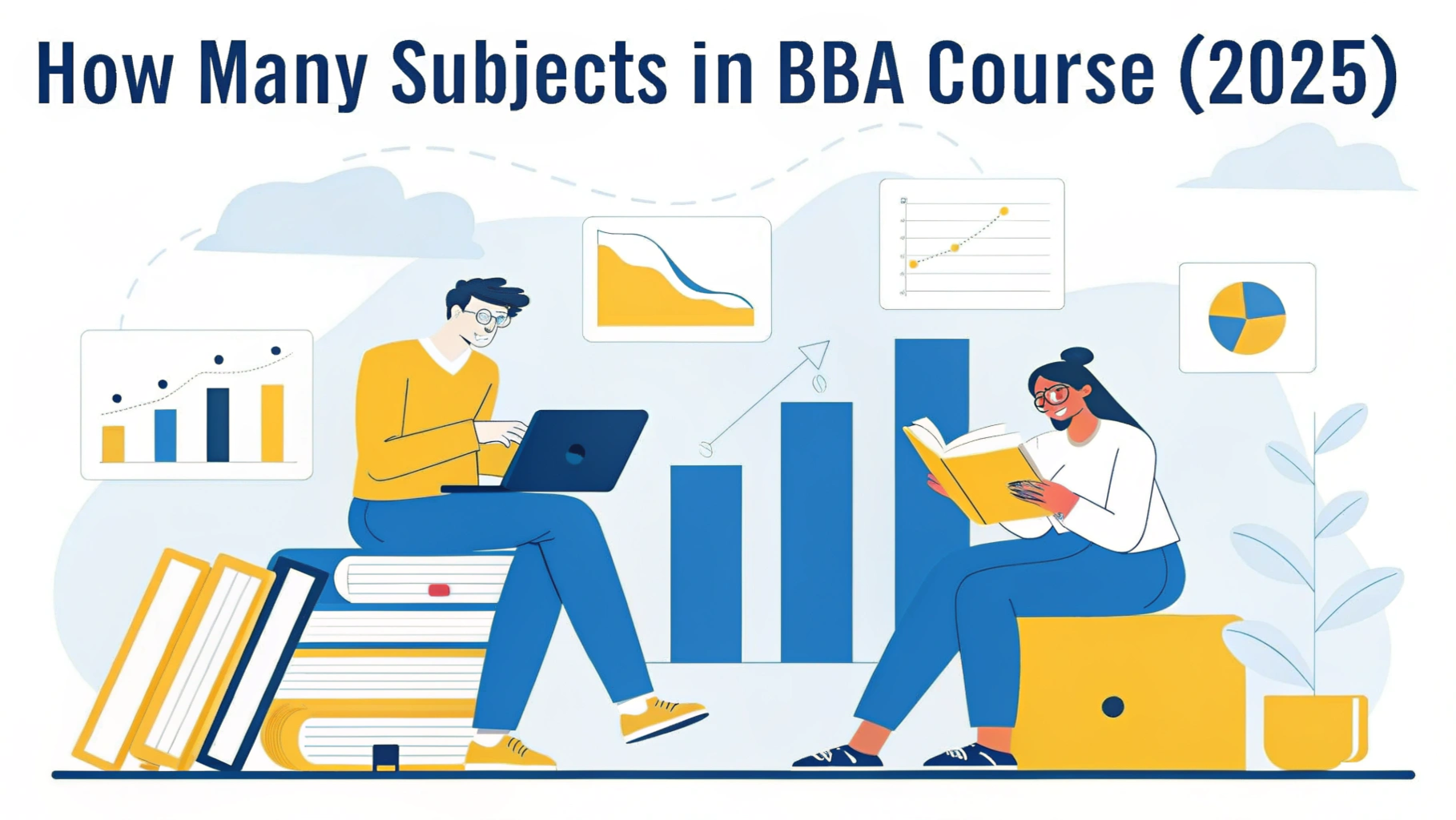Choosing to pursue a Bachelor of Business Administration (BBA) is an exciting step toward building a career in management, marketing, finance and more. But before you dive in, one of the first questions students usually ask is: “How Many Subjects in BBA Course do I need to study?”
It’s a fair question because knowing what lies ahead helps you plan your time, energy, and even pick the right specialisation later on. The BBA program usually runs for three years with six semesters, and each year comes with a mix of core subjects, practical projects, and sometimes electives based on your interests.
In this blog, we’ll give you a year-wise breakdown of subjects, explain how the credit system works, and touch on optional and specialised topics you might come across. By the end, you’ll have a clear picture of what to expect semester by semester, so you can start your BBA journey with confidence
First Year Subjects (Semester 1 & 2) : How Many Subjects in BBA Course

- Principles of Management – Learn the basics of managing people and processes in an organisation.
- Business Communication – Improve your writing, speaking and presentation skills for a professional setup.
- Financial Accounting – Understand how money is recorded, managed and reported in a company.
- Business Economics – Get a simple view of how markets, demand, and supply affect business decisions.
- Business Mathematics or Quantitative Techniques – Basic maths and statistics used in management and decision making.
- Computer Applications in Business – Introduction to tools like MS Office, spreadsheets and basic IT skills for business tasks.
- Environmental Studies / Business Ethics – Learn about sustainable practices and ethical responsibilities in business.
Second Year Subjects (Semester 3 & 4)

In the second year of BBA, things start getting a bit more detailed. You move from just understanding the basics to actually seeing how different parts of a business connect and work together. This is where you begin linking theory with real-world scenarios.
Common subjects you’ll usually study in the third and fourth semesters include:
- Marketing Management – Learn how products and services are promoted, priced and positioned in the market.
- Human Resource Management (HRM) – Understand how companies hire, train and keep employees motivated.
- Financial Management – Explore how businesses plan, control and invest money wisely.
- Operations Management – Study how goods and services are produced and delivered efficiently.
- Business Law – Get an idea of the legal rules businesses must follow.
- Management Accounting – Dive into cost analysis and decision-making tools for managers.
- Research Methodology or Business Research – Learn how to collect and analyse data for better decision making.
- Management Information Systems (MIS) – Understand how technology supports business processes.
Some universities may include internships, live projects or case studies at this stage to help you apply what you learn. By the end of your second year, you’ll be able to see the bigger picture of how each department works together to keep a business running smoothly.
Final Year Subjects (Semester 5 & 6)

Your final year in BBA is all about putting everything you have learned into practice. This is when you start focusing on advanced topics, specialisations, and preparing for your career or higher studies. Most colleges also include internships, major projects or presentations during this stage.
Here are the common subjects you will find in the fifth and sixth semesters:
- Strategic Management – Learn how top-level decisions are made to grow and sustain a business.
- International Business – Understand how companies operate across borders and deal with global markets.
- Entrepreneurship Development – Explore how to start, plan and run your own business.
- Business Policy – Study how policies guide company decisions and long-term goals.
- Electives / Specialisation Subjects – Depending on your chosen field (like Marketing, Finance, HR, Analytics) you’ll pick focused subjects.
- Project Work / Dissertation – A hands-on research or practical project that brings together everything you have studied.
- Internship / Viva – Real-world work experience that gives you a taste of the industry.
By the end of the final year, you will not only have academic knowledge but also practical exposure. This mix of skills makes you ready to step into a job, launch a start-up, or pursue an MBA or other higher studies.
Optional or Elective Subjects in Each Year

Apart from the core subjects that every BBA student has to study, most universities give you a few optional or elective subjects. These are like “bonus” topics that you can pick based on what interests you the most. They help you shape your degree toward the career you want.
Here’s how it usually works:
- First Year – Not many electives here. Most colleges focus on giving everyone the same strong foundation.
- Second Year – You may start seeing a couple of electives. For example, if you like numbers, you might get to choose a finance-related subject. If you like marketing, you could pick something like consumer behaviour.
- Final Year – This is where you get the most choice. You can usually pick from specialisations like Marketing, Finance, Human Resource Management, Business Analytics, International Business, or even Entrepreneurship. Each specialisation comes with 2–4 focused subjects that go deeper into that area.
These electives are super useful because they allow you to build expertise while still finishing your general BBA coursework. They also look good on your resume since they show employers what area you are passionate about.
Subject Count in Specialised BBA Programs

Not every BBA is exactly the same. Some colleges offer specialised BBA programs that focus on one area from the very start. For example, you might find BBA in Digital Marketing, BBA in Finance, BBA in Human Resources, BBA in International Business and more.
In a specialised BBA, you will still study the core management subjects that every student learns, like accounting, economics and management principles. But on top of that, you get extra subjects focused on your specialisation.
Here’s a quick idea of how it usually looks:
- General BBA – Around 30 to 35 subjects across six semesters.
- Specialised BBA – Usually the same 30 to 35 subjects plus 4 to 8 specialisation-focused subjects, depending on the college.
This means the total number of subjects can be a bit higher in specialised programs, but the extra topics help you build deeper knowledge in the area you want to work in. It’s a good choice if you are already sure about your career path and want a head start.
Practical vs Theoretical Subjects
A BBA course is not just about reading textbooks. It’s a nice mix of theoretical learning and practical application.
- Theoretical subjects are where you learn the concepts, frameworks and ideas behind how businesses work. For example, subjects like Business Economics, Principles of Management and Business Law mostly focus on theory. These help you understand the “why” behind business decisions.
- Practical subjects are where you get to apply what you have learned. This can be through projects, presentations, internships, case studies, computer labs or research work. Subjects like Management Accounting, Research Methodology, Entrepreneurship and MIS often include hands-on activities.
This balance is what makes BBA so useful. You don’t just memorise facts, you actually get to practice skills like teamwork, problem-solving, data analysis and communication — the same skills you will need in any job or even if you start your own business.
Conclusion
A BBA course gives you a complete introduction to how businesses work. Over three years, you’ll cover a good mix of core subjects, electives, practical projects and even internships. The exact number of subjects may change from one college to another, but the structure stays similar — you start with basics, move into more detailed management topics and finish with specialisation and real-world exposure.
If you are planning to join BBA, now you have a clear picture of what to expect semester by semester. With the right approach, managing the subject load is absolutely doable. Focus on building your concepts, take projects seriously and use electives to explore the areas that excite you the most. This way, by the time you graduate, you’ll have both knowledge and skills that make you ready for jobs, entrepreneurship or higher studies like an MBA.
Explore our online programs to become future-ready
Transform your career with industry-aligned courses designed by experts.
View All Courses
